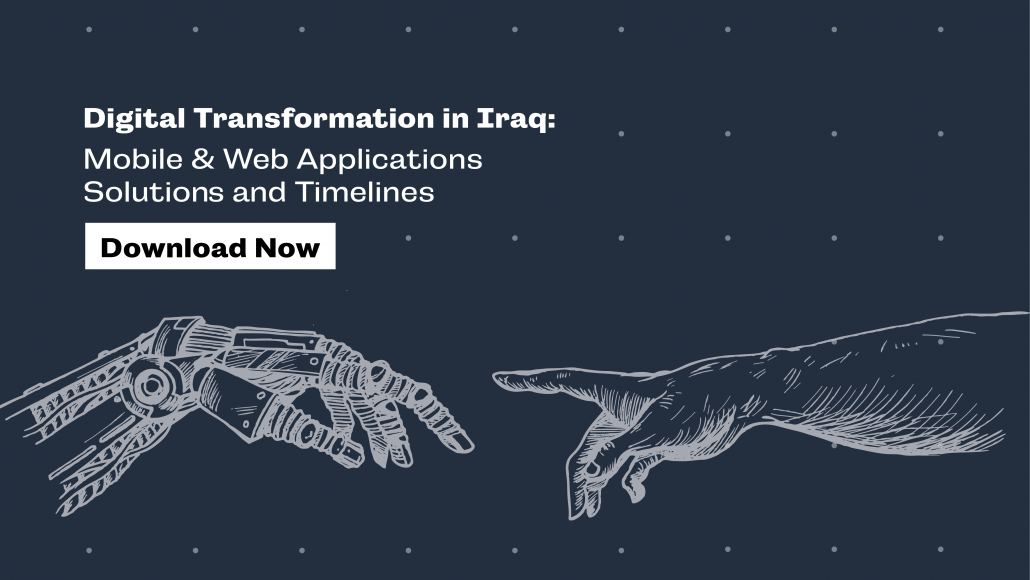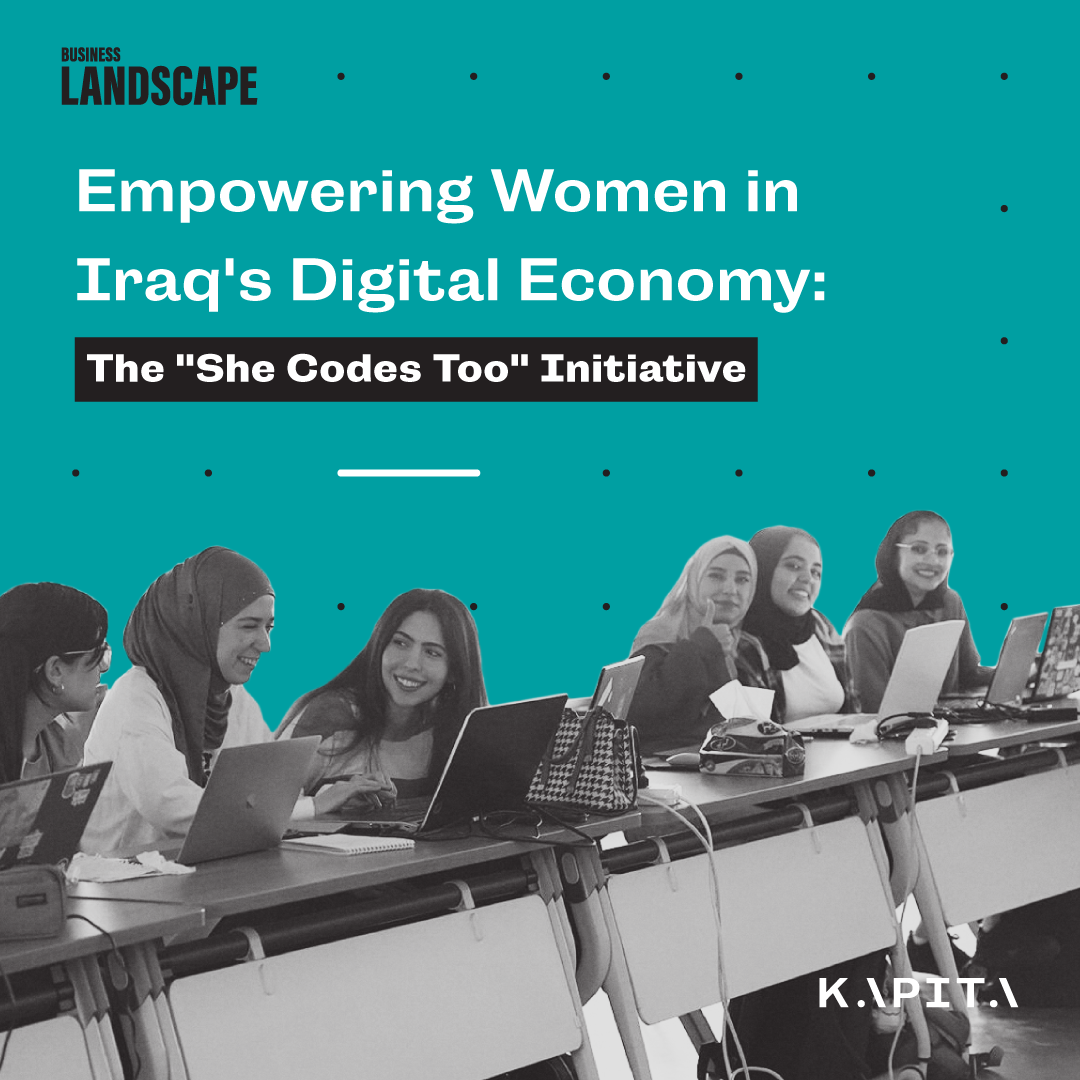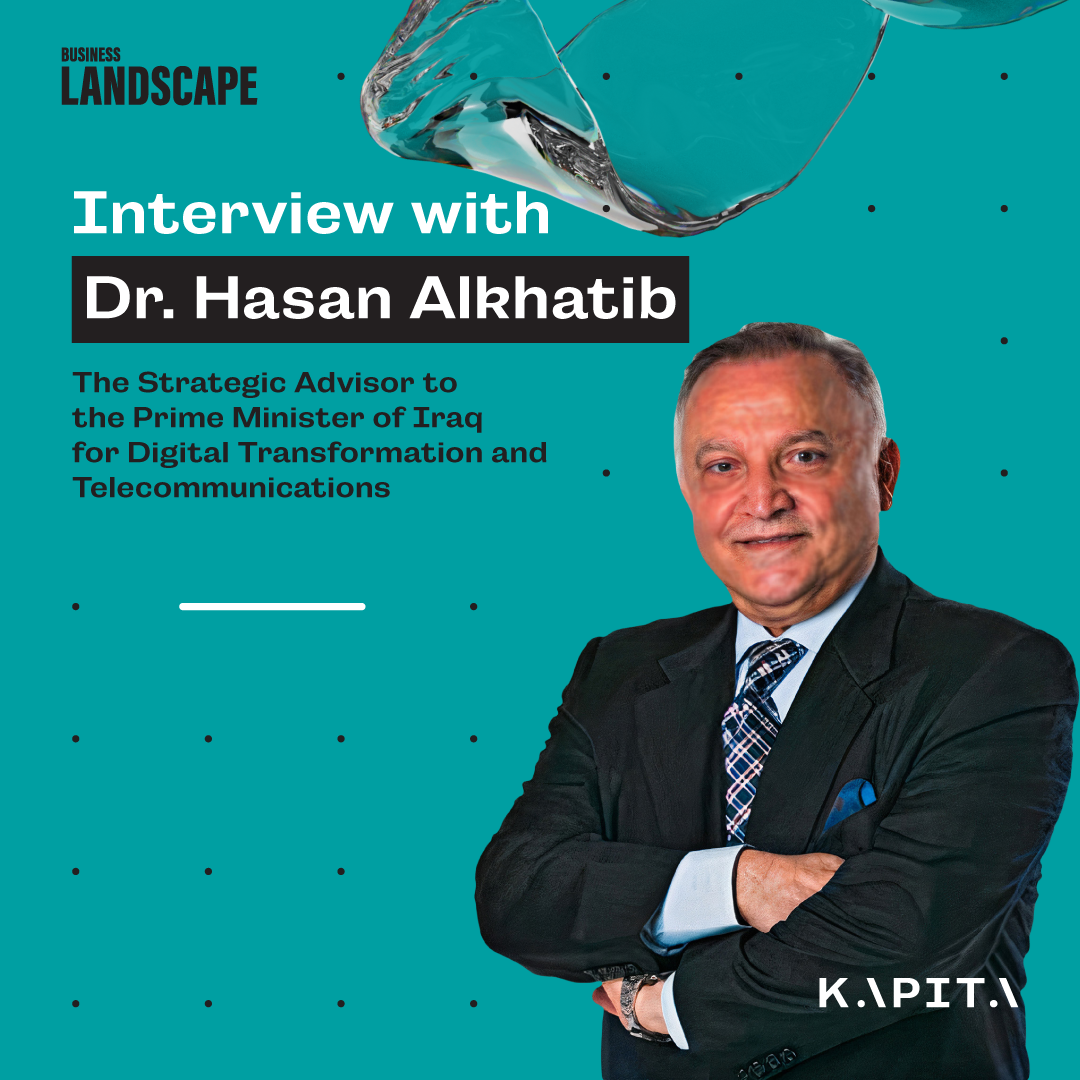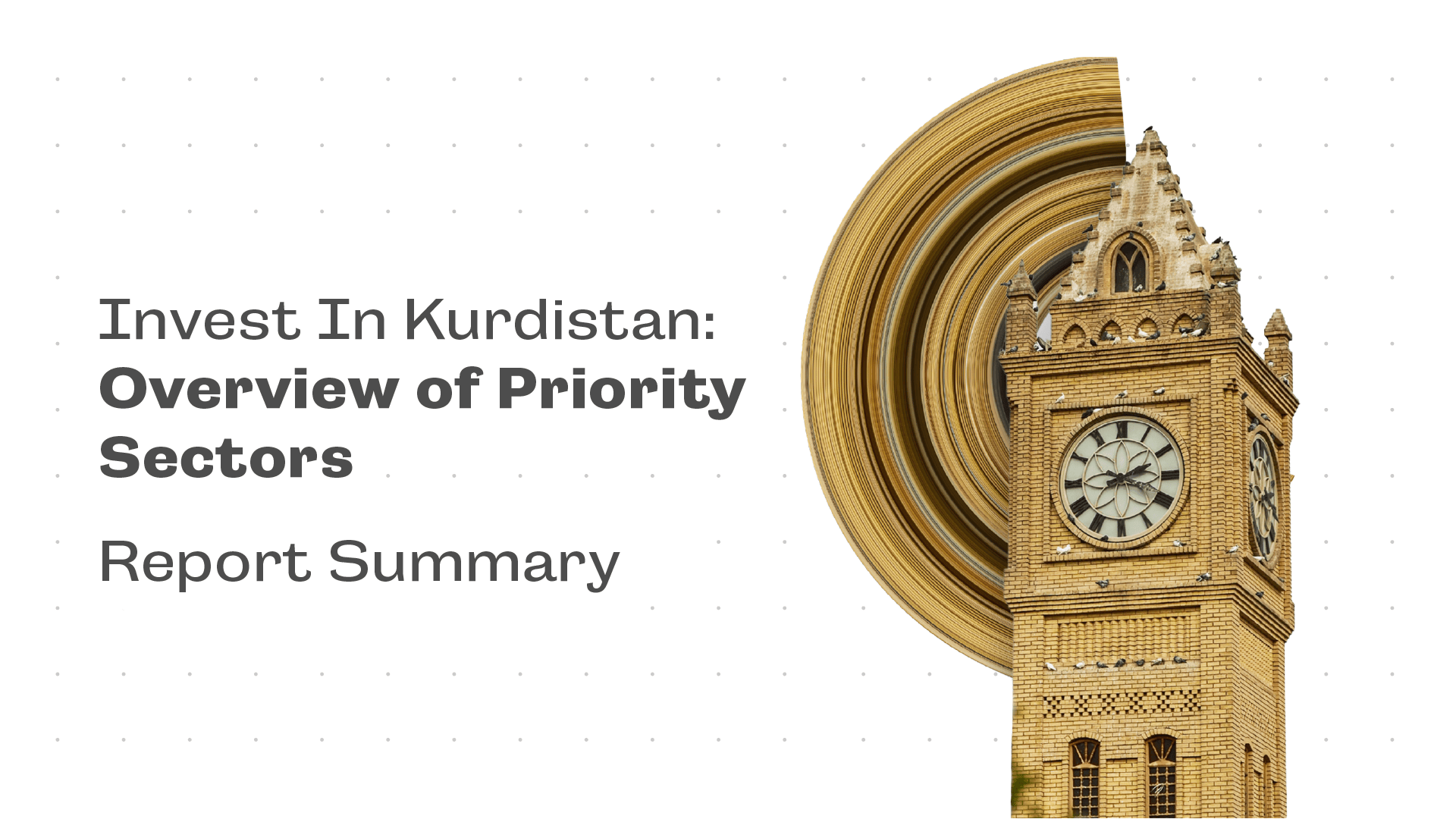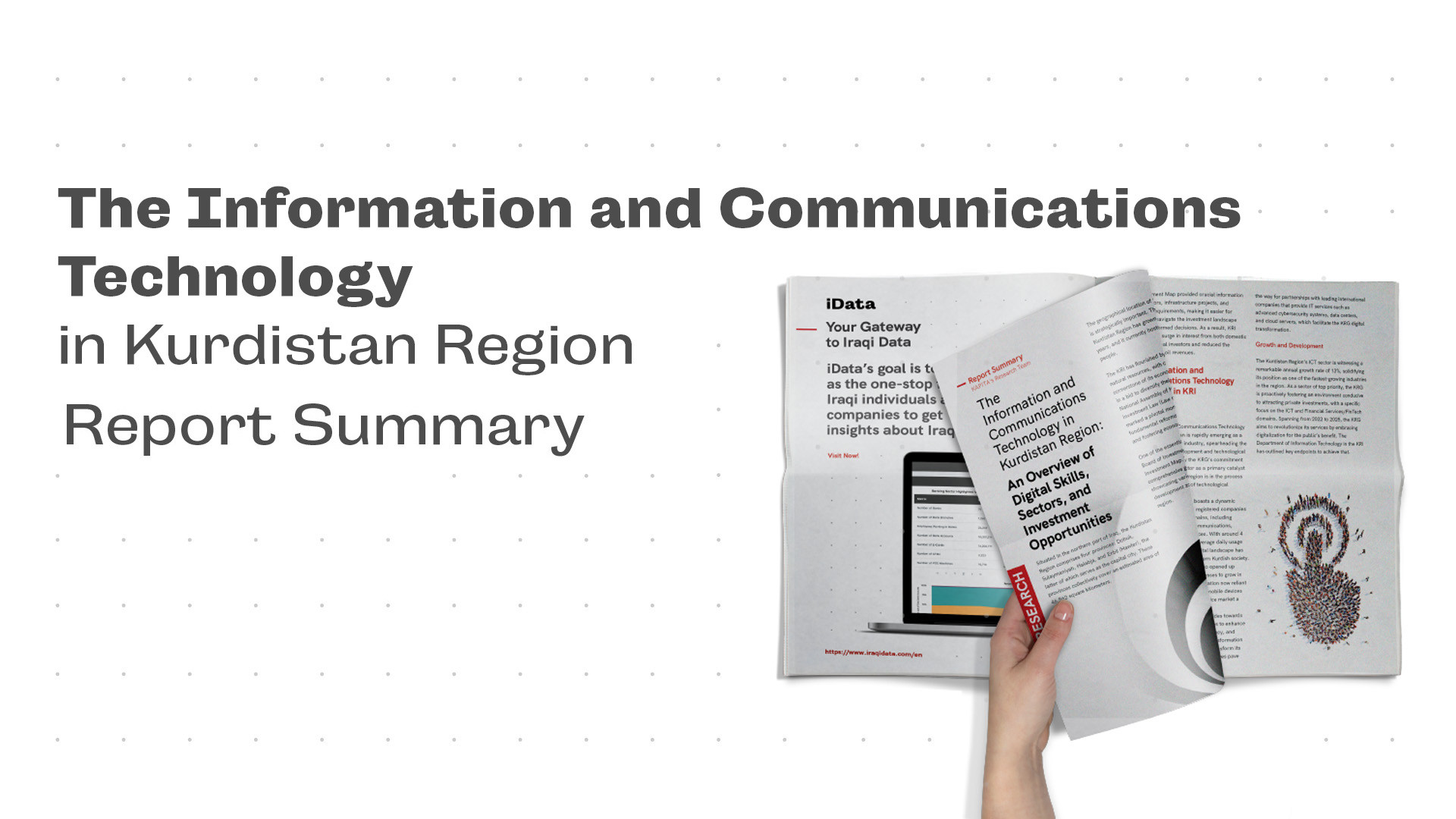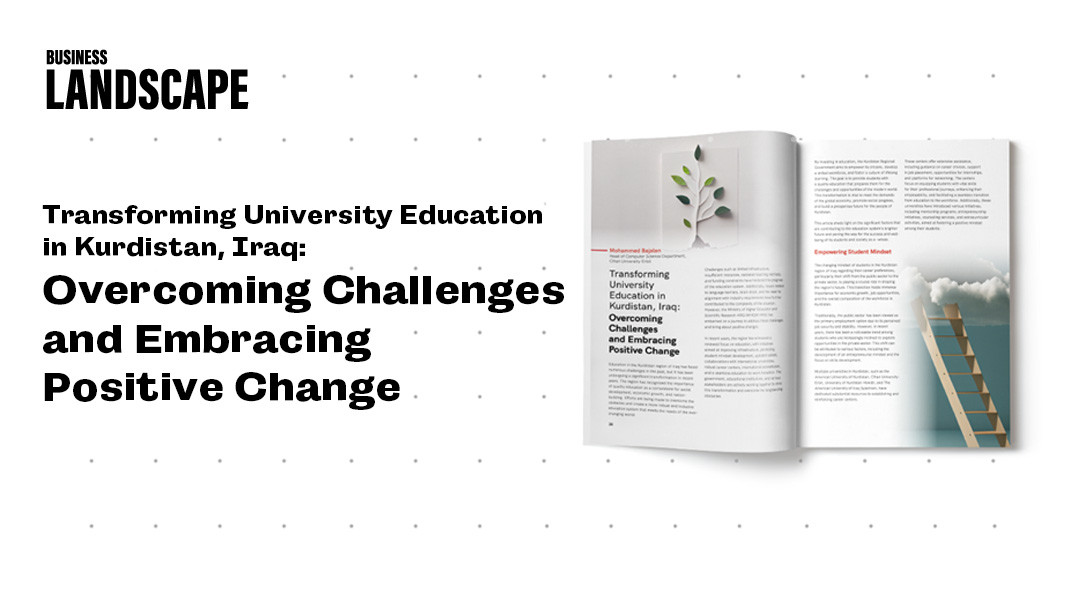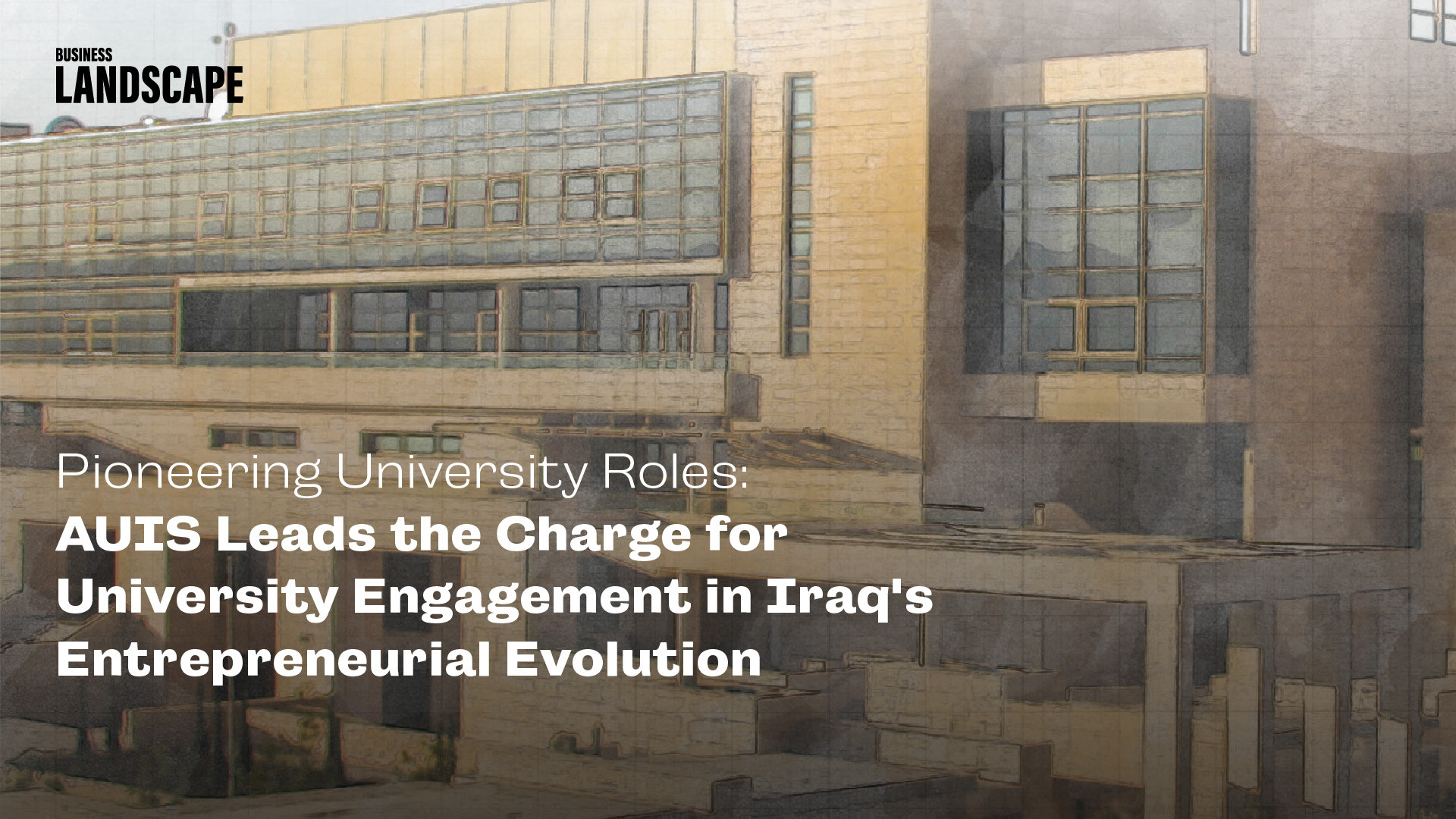Digital Transformation in Iraq: Mobile & Web Applications Solutions and Timelines
KAPITA’s Research Team
Report Summary
Introduction
Modern society is heading rapidly towards the fourth industrial revolution, the era of digitization, where data and technology are involved in everything. Digital transformation (DX) is the act of adopting digital technologies and integrating them into business models, thus creating new business models that are reshaping the markets faster than ever.
In 2015, the digital vortex report was published to better understand the effect of digital transformation on businesses worldwide. Seventy-three percent of company leaders were not concerned by the effect or thought it would have a moderate impact on their businesses. This changed drastically in their 2019 follow-up report, as 88% of company leaders believed that major transformative impact will befall their business.
Digital transformation does not cancel original business models and is not limited to basic digitization of work, it involves managing and modifying the existing business, addressing fundamental problems, and building upon it at the same time.
Benefits & Importance
Digital transformation disrupted traditional businesses with innovative technologies, products or services, and processes. It allowed many to explore the gaps left in the market and create solutions for them, becoming a source of continuous entrepreneurship.
According to the digital vortex report of 2019, media and entertainment, technology products and services, and telecommunications are the sectors to be most affected by digital transformation in the upcoming years.
Sectorial Digital Advancement
Education Sector
There are 11 types of learning technology products, divided into 2 major categories; legacy products and advanced learning technologies.
legacy products
Self-paced eLearning applications, also known as asynchronous courseware, are applications like Coursera and EdX designed to help learners progress in their assigned courses at their own pace.
Digital ReferenceWare applications, such as Quizlet and Course Hero are used to ease student search of the proper references, providing test preparation, audiobooks, videos, and manuals.
Collaboration-based Learning applications provide synchronous live online classes and tutoring, such as Zoom and SkillShare.
Learning Management System is an online integrated software used for creating, delivering, tracking, and reporting educational courses and outcomes.
Advanced learning technology products consist of AI-based Learning-Mixed Reality Learning, Game-based Learning, Cognitive Learning Applications, Mobile Learning Applications, Location-based Learning, and Education and Training Bots
Existent Mobile and Web Solutions in Iraq
Najeh Platform was the first platform in education in Iraq, established in 2011 for the purpose of listing student results for baccalaureate exams. In 2022, Iraq has 4 startups in the EdTech sector, providing digital solutions for various issues and innovative methods of teaching and learning. IoT Kids teaches kids about automation, coding, and robotics using training bots and game-based design. Meanwhile, Medresty and Eduba, which were founded in 2013 and 2019, respectively, are online learning management systems that help create a framework to organize the educational system components.
Newton and T3leem platforms, initiatives from the Ministry of Education (MoE), were established to help bridge the gap caused by students disengaging from the formal classroom format after the pandemic.
In tutoring and test preparation, Abwaab and Orcas are examples of startups that connect students with tutors and educational content.
Retail Sector
The future of retail is quite clear globally; a consumer can access the market at any time and anywhere, and it could be categorized as follows:
Marketplaces refer to platforms that allow other vendors to display their products so that customers are able to purchase from those vendors using the marketplace platform as the mediator.
Retail Places are platforms that own the goods or services and provide and simply sell them directly to customers.
Aggregate platforms refer to platforms that aggregate orders from customers who wish to buy from international brands and deliver those orders to customers in Iraq.
Existent Mobile and Web Solutions in Iraq
The thriving e-commerce scene in Iraq is evident as almost 80% of Iraqis have engaged in online shopping within a three-month period. Another indication is that many marketplaces receiving funding rounds, Miswag $1.6 million Pre-Series A round, and Orisdi securing funding and partnership deals with Al Sharqiya TV network.
Shopping from international marketplaces like Amazon and eBay is still an issue for Iraqis; therefore, aggregate platforms like PurePlatform and Wasil are trying to solve that problem. Some platforms are specialized in a certain kind of retail. ElRayan and AL-HAFIDH are specialized in electronics.
Transportation Sector
The business of online-to-offline (O2O) is where consumers place orders for goods or services online and receive the goods or services at an offline outlet, many businesses started with food delivery, and many later moved into “anything” delivery.
Food delivery providers can be divided into 2 categories as being either Restaurant-to-Consumer Delivery or Platform-to-Consumer Delivery. The former prepares the food and delivers it, while the latter partners with restaurants that may or may not deliver items themselves.
In Iraq, there has been an increase for both categories by 78.9% and 50% for both categories respectively in the span of 5 years.
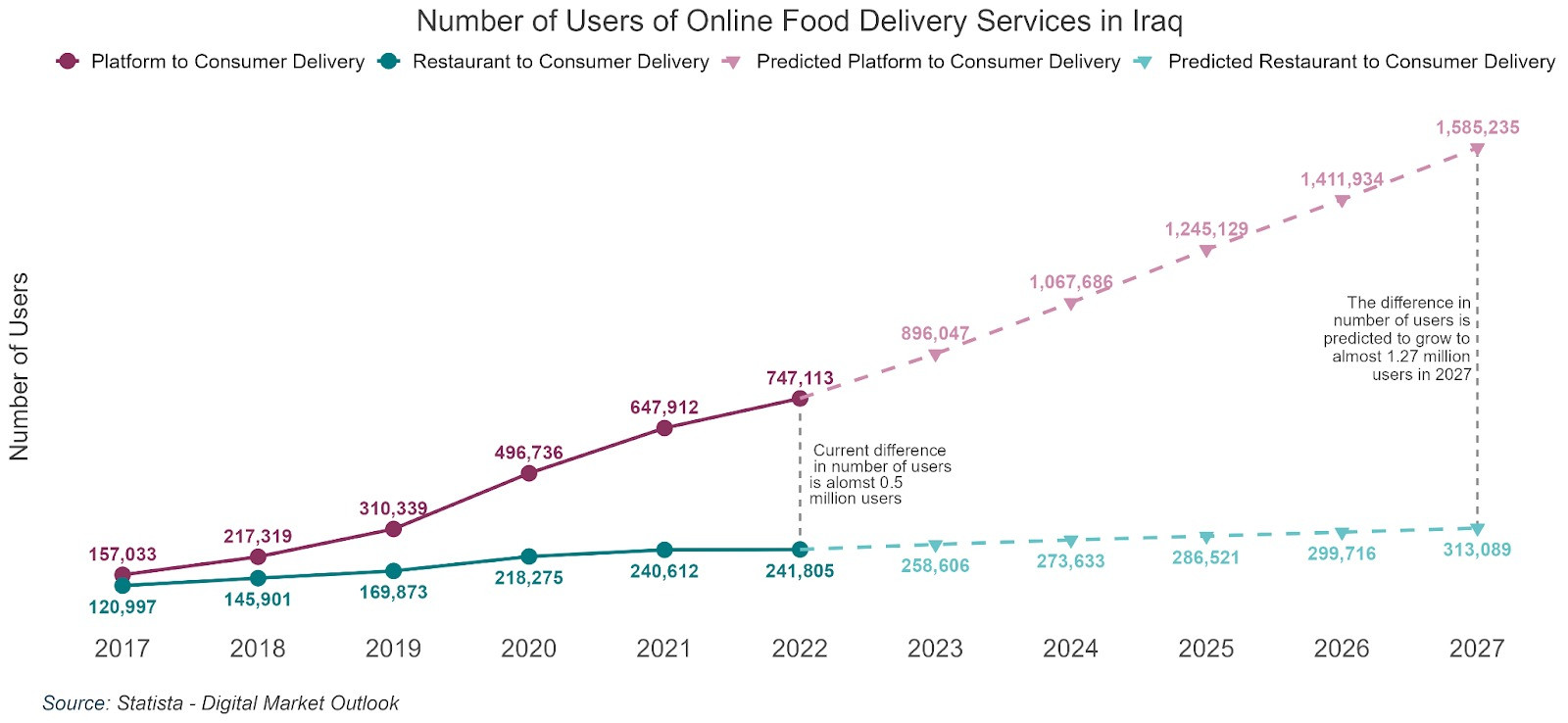
Regarding the revenue from food delivery services, by 2020, albeit the COVID-19 pandemic, platform-to-consumer deliveries were earning 1.7 times the revenue of restaurant-to-consumer deliveries.
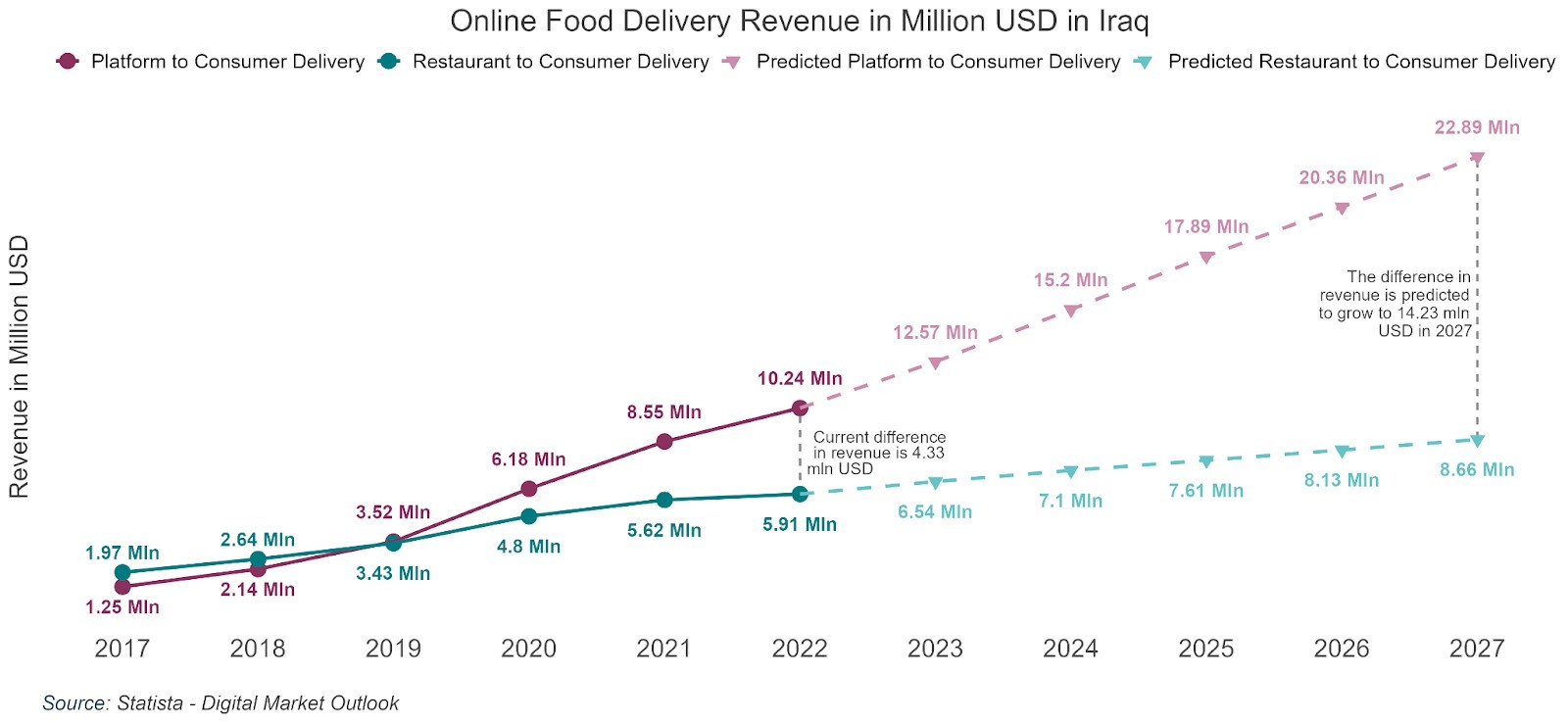
Ride-hailing services are also known as ride-sharing or P2P mobility services. It involves the transition from private car ownership to mobility as a service (MaaS), and they include carpooling, ride-hailing, ridesharing, and carsharing. The technological advancements have evolved around optimizing the provided services, technologies like on-the-go traceability, gig worker and hybrid fleet real-time data hubs, and predictive analytics for route optimization for easier navigation and transportation.
Anything Delivery Mobile and Web Solutions in Iraq
Mishwar, launched in 2015, was one of the first startups to deliver groceries in Baghdad. In the following years, many food delivery services were launched such as Talabatey. Some even expanded their operations like Alsaree3 food delivery startup moving to “anything” delivery through its sister company Al Zajel.
Regional startups like Toters and Talabat joined the Iraqi market in Baghdad, Erbil, Basra, and Najaf. Upon their entry into the Iraqi markets, real competition over anything delivery market was introduced to local businesses, allowing customers the opportunity to choose the best service provider for their needs.
Ride-hailing Services Mobile and Web Solutions in Iraq
Karwa was the first ride-hailing application to start operating in Iraq in 2017. As the competitiveness of the ride-hailing service grew, many companies became specialized; Lady Go, for example, was a ride-hailing service that hires women drivers for women and children passengers only. Taxi Al-Mumayaz and Taxi Almosafer are for travelers to and from Baghdad international airport, and student-focused ride-hailing like Transpi and Wasla operate in Baghdad and Mosul, respectively.
There is huge potential for growth for ride-hailing businesses in Iraq, with Baly becoming the first Iraqi ‘super app’ to raise 10.5$ million in a funding round in 2022. It is worth mentioning that international companies like Careem and Bolt are operating in multiple Iraqi cities. Careem entered the Iraqi market and raised the bar high for the local competitors due to the careful customer service they provide.
Healthcare Sector
Regarding the digital transformation of healthcare, there are new market segments and roles of the digital healthcare ecosystem and they include:
Information provider is a knowledge and education platform for patients and healthcare providers, as patients could ask for second opinions or information while healthcare providers could upload information or ask for second opinions.
Healthcare intermediaries include telehealth providers offering medical consultation using digital technologies; patient engagement platforms that connect patients with healthcare providers for follow-ups of post-acute conditions like surgical interventions; remote monitoring providers in the form of wearable devices and sensors that allow physicians to monitor patient’s conditions; emergency communication/Notification network that enables multidisciplinary physicians to communicate with each other in emergency situations; and Online scheduler that allows patients to check doctor recommendations, book online appointments, and write feedback on their experience.
Data collection is through wearable devices that record cardiorespiratory status, and biomarker collectors who send kits to patients to supply physical samples and return them for analysis.
Wellness applications include mobile health and wellbeing applications; such as women’s wellness applications for tracking menstrual cycles or pregnancy, emotional wellbeing applications, sleep tracking applications, and fitness applications.
Data storage, Personal health records (PHR) and Electronic health records/Electronic medical records (EHR/EMR) are applications that provide patients and healthcare providers with the capacity to save healthcare records for patients.
Market intermediaries, such as ePrescription softwares generate prescriptions electronically, thus decreasing the error-rate of prescriptions. Customer Relationship Management (CRM) applications track communications and relationships between medical representatives, their managers, and clients like physicians and pharmacists.
Existent Mobile and Web Solutions in Iraq
Amal Tech was the first initiative for establishing an EHR in Iraq at National Amal Hospital for oncology, which gained support from Earthlink.
Ahjaz Tabibak and Razi are doctor recommendations and scheduling applications, which operate in Mosul and Baghdad, respectively. Teami, a CRM application for medical representatives, offers them and their supervisors a tool to organize on-field operations.
MetaPharma and Mercato are B2B applications in the pharmaceutical industry that help pharmacists place and receive medication orders without contacting suppliers themselves. They can also check prices and availability of items easily, introducing transparency to the pricing of items which has long been an issue in the medical field for healthcare providers and patients alike.
Financial Sector
FinTech companies offer digital financial services (DFS), which are basic financial services that rely on digital technologies for their delivery and use by consumers, to providers, and other customers.
Financial services are various in nature, some are related to transactional services referencing payment methods while others are related to exchanges between various parties. Some financial services include complementary services of ecosystem products such as insurance services on an e-commerce platform. The last kind of financial service is somewhat relatively independent of the ecosystem, such is the case with a mobile payment service for in-store purchases.
Areas of innovation in the banking sector include but are not limited to banking and payments, credit and lending, insurance, retail investments and pensions, investment management, wholesale banking, and capital markets. Besides fintech startups, many companies are building their own infrastructure as a service, eventually reducing costs and complexity of the operations.
The COVID-19 pandemic had an impact on the Iraqi financial sector, which was very dependent on “Cash-on-delivery”. The year 2019 registered transactions worth 630$US million via Mobile Point of sale payments (POS), while in 2020, the value increased to 1.18$US billion.
The pandemic paved the way for cashless transactions, unfortunately, the sector was yet to receive the needed attention as no specific laws have been passed to govern the fintech space. However, in 2023, the Central Bank of Iraq started implementing Cabinet Resolution No. (23044) of 2023, which includes providing electronic payment services in the government and private sectors to enhance electronic payment.
In 2020, NEO was the first digital-only payment card issuer to operate in Iraq. Later on, many others followed NEO’s example. QiCard and Switch are now alternatives to the core banking systems, an option that is yet to be provided by the traditional outdated national banks in Iraq. AsiaPay and ZainCash provided the first MPS service in Iraq in 2015. Wayl is a payment company for social media merchants and freelancers. They provide sellers with digital acquiring services and a checkout interface for customers.
Travel, Tourism & Hospitality Sector
Digital transformation elements in this sector include Destination Management Systems (DMS), Centralized Reservation System (CRS), Customer Relationship Management (CRM), Management Information Systems (Electronic Information Systems), and Electronic Booking Platforms.
Existent Mobile and Web Solutions in Iraq
Travel startups do exist in Iraq but many are just small businesses offering a battery of services. Recently, some startups started offering specialized services; for example, Sindibad is an application for booking flights with facilitates access to travel services in Iraq, Kawenter specializes in procuring visas for Iraqis, and Safr offers tours alongside flight booking services and visa procurement.
Emerging Digital Transformation Opportunities in Iraq
Agriculture
Digital transformation in the agriculture sector could be divided by access and penetration need into 3 categories:
Nascent technologies include weather alerts and extensions, and electronic mechanization.
Transitional technologies include marketplace platforms, remote sensing technologies, supply chain tools, electronic pest and disease surveillance, price forecasting technologies, and farm management platforms.
Advanced technologies include farm robotics, production forecasting and optimizations tools, and controlled environment agriculture are some of the technologies in this category.
Green Shaov is an agritech startup that uses smart farming and monitoring systems to resolve issues farmers face. Grow Green (also known as Hadaqchi) is a marketplace startup that tends to Iraqi gardens and gardening services.
Telecommunications
The 3 major telecommunications operators in Iraq - Zain, Asiacell, and Korek - and the national internet provider “Earthlink” have their own designated mobile applications.
A customer can recharge, subscribe to services, know more about offers and packages, and report grievances to a chatbot or a live operator easily via these applications. Recently, Iraq witnessed a breakthrough with the experimental launch of the embedded SIM (eSIM) smart chip service.
Media & Entertainment
Specific trends in digital media and interactive entertainment include access to streaming video content with virtually no buffering, such examples include over-the-top (OTT) content streaming delivered by Netflix, Spotify, and MENA region’s Anghami, Starzplay, and Shahid; and scalable platforms for delivering content (including live broadcasts, video on demand, games, software and web-sites) to customers on their devices at any time like Tamatem gaming company in Jordan.
A bright example in the Iraqi entertainment scene is Laoob, which is a football-related application that allows players to build their profiles, give and receive feedback on their performance, book pitches, and many other.
Iraqi Cinema is the first cinema to operate since 2003, currently showing films in 4 malls in Baghdad, and has an application that has several features like showing times and ticket booking.
Energy
The energy sector is not the brightest sector when it comes to digital transformation, with its digital acceleration index falling behind other sectors.
New services in the power and utilities generation involve direct-to-consumer offerings such as in-home energy installations like solar panels; energy efficient equipments like power-saving light bulbs; energy storage systems like batteries; on-site power generation mostly for data centers and other large power-demanding construction projects; as well as digitizing energy dispatch services, minimizing supply cost and hauling gas or fuel efficiently to facilities and generators.
KESK, founded in 2018, is the first greetech company in Iraq that offers green engineering and design consultancy and branded solar-powered AC units. Other startups include Tanweer Energy Solutions and Al Hadbaa.
Job-matching Platforms
Employment platforms, where employers post job requirements for a position to be filled, are very popular in Iraq. Examples include The Khana, Hawa jobs, Iraq jobs Scout, and MSELECT.
Real Estate
Digital transformation of the real estate business is also commonly known as property technology. It refers to the innovation and impact on the real estate environment.
Researchers have categorized platforms into four groups based on user connections:
Finance/capital investment activities are platforms that offer a range of information and data analytics products to help investment managers, asset managers, surveyors and those with capital to make better market decisions regarding their existing assets and investment.
Commercial real estate market refers to platforms used by commercial landlords to connect to their occupants, tenants, users, building management, and asset managers.
Building management and maintenance platforms operate between both residential and commercial markets, allowing building management to connect with building labor, contractors, homeowners, and tenants.
Residential market, a large number of platforms operate in this market, they link many entities such as residence landlords, residence buyers or renters, tenant verification and screening services. This platform helps home buyers connect to developers and capital lenders to ease purchase transactions.
Shanashel, PAYA, Dalali and Homele are platforms and applications that present units of various types for sale or for rent, OpenSooq also has a category displaying properties for sale or rent. PAYA provides more than 20 services and notification system that delivers notifications whenever there is a price change to users’ favorites list.
Government Portals & Utilities
There are different innovations in governmental portals and utilities related to process innovation; administrative ones such as creating a ‘one-stop shop’ by a municipality, or technological ones rendering governmental services digitally. Another digital transformation service is Product or Service innovations which refer to the creation of new services or significant improvements to an existing service, but also to new users like creating on-line tax forms.
The Iraqi government launched its online portal, Ur portal, in September 2021. Ur portal contains hyperlinks to 89 governmental services to decrease bureaucracy and improve government efficiency. Such services are commendable, but the Iraqi government still has a long way to go in providing proper platforms for Iraqis. For example, enabling online payment services for governmental services and utilities.
Digital Transformation Challenges
Societal Acceptance
Many Employees presume the existence of technology will render them useless. This fear is not without merit as employment is, generally, shifting away from low-skilled jobs and high routine-content tasks that are able to be automated.
Infrastructure
Digital Disruption Technologies
The advancement in technologies, regulatory practices, and the emergence of new business models govern the scene of digital transformation of companies. Digital disruption tools and technologies include IoT, big data analytics, and artificial intelligence, to name a few. Public Wi-Fi, and 5G have increased users' access to mobile devices, coupled with the relative simplicity of digital money transfer.
Education System
When it comes to Iraq, the educational system is still underdeveloped; 64% of Iraqis do not trust the education system in providing them with the proper skills to work in the private sector.
Human Capital Skills
A particular challenge is the adaptation of the labor force to new skill requirements. The most important skills to gain are mostly related to science, technology, engineering and mathematics (STEM), especially Information and communication technology (ICT) skills. This issue is further exacerbated by the very quick technological progress in STEM skills themselves so fast that newer STEM skills are always scarce.
